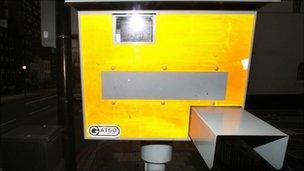Speed camera cuts 'mean disaster'
- Published

Campaigners have said it would be a "disaster" if council cuts in England and Wales mean speed cameras are scrapped.
Oxfordshire County Council is switching off its 72 speed cameras after funding for its road safety partnership was cut by 拢600,000.
The government says this is evidence of it delivering its pledge to end central funding for fixed speed cameras.
Road safety campaigners fear councils could follow suit, endangering lives.
Dan Campsall, from Thames Valley Safer Roads, said he understood the budget pressures faced by local authorities, but he feared the decision to switch off speed cameras would lead to a rise in casualties on the roads.
"The cameras have been proven to provide casualty reductions and without funding they can't continue to be supported and we may see casualties rise again," he said.
"It's not only a problem that Oxfordshire is facing. There are local authorities up and down this country who are going to have to be making some very tough decisions on the vital area of road safety."
The government has cut funding to road safety partnerships and local authorities now have to decide how to implement savings.
'Risking lives'
Ellen Booth, a campaigns officer for road safety group Brake, said: "It would be a disaster if these cuts were passed on in full by county councils to road safety partnerships.
"It would be especially hard to justify the idea that all speed cameras should be turned off. Speed cameras are a really cost effective way of managing speed, which is one of the biggest issues on our roads.
"To get rid of them would be a backward step and we would really be risking people's lives."
Shadow home secretary Alan Johnson said removing cameras that had been shown to reduce road casualties was "a big, big mistake".
"Everyone who has analysed this has said that speed cameras have been an important part of the dramatic improvement on our roads," he told Sky News.
"The carnage on our roads every year...has gone down dramatically. It has gone down to below the levels, as I understand it, of the 1930s when there were far fewer cars on the road. It is a kind of a saloon bar view - 'these bloody speed cameras, get rid of them'.
"If they are connected to saving lives of not just adults but children as well, who are particularly vulnerable on our roads, then they are performing a useful function."
Ministers said "difficult choices" must be made but they hoped councils would use available funds for other road safety measures.
Road safety minister Mike Penning said: "In the coalition agreement the government made clear it would end central funding for fixed speed cameras.
"Local authorities have relied too heavily on safety cameras for far too long so I am pleased that some councils are now focusing on other measures to reduce road casualties. This is another example of this government delivering on its pledge to end the war on the motorist."